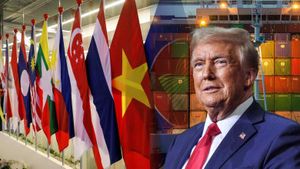Argentina is currently contemplating whether to exit the Paris climate agreement, prompting concerns not just within the South American nation's borders but also around the globe. President Javier Milei, aligning himself with the recently elected U.S. President Donald Trump, is leading this significant shift. The reevaluation of Argentina's commitment to the 2015 accord is part of broader changes implemented by his administration, driven by skepticism about the causes of climate change and how they relate to national interests.
The country's Foreign Minister, Gerardo Werthein, opened up about the discussions surrounding the Paris Agreement, admitting the government has fundamental doubts about the widely accepted scientific consensus linking human activities to climate change. According to Werthein, Argentina’s mode of dialogue at global climate summits will undergo significant reconsideration. He remarked, "We’re reevaluatin' our strategy on all matters related to climate change," hinting at a potential pivot away from previous government commitments to environmental action.
Notably, Argentina has already made moves to scale back its involvement at the annual COP29 climate conference taking place this year in Baku, Azerbaijan. Shortly after Milei's administration took office, Argentina's delegation left the event prematurely—an action unprecedented for the nation and one echoing sentiments already expressed by Milei. He has previously dismissed the climate crisis as "a socialist lie," positioning the country’s climate stance-a topic that's long been seen as non-negotiable for many governments-as entirely uncertain.
Werthein characterized the decision to withdraw the Argentine delegation as exercising the nation's sovereignty, saying, "We decided to withdraw our delegation and reevaluate our position, nothing more. I think it’s a sovereign right." While Werthein confirmed no concrete decision had been made yet about completely withdrawing from the Paris Agreement, he hinted at major disagreements between Milei’s government and the deal’s agenda, which includes commitments to reduce fossil fuel emissions.
The ramifications of such potential moves are vast. If Milei follows Trump’s lead—a move highly likely since he was the first international leader to meet with Trump post-election—there’s concern over what this could mean for other nations considering their commitment to the climate accords. The past choice by the U.S. to exit the Paris Agreement reverberated around the world, prompting fears of cascading withdrawals. During Trump's presidency, the U.S. was the sole country to officially withdraw from the agreement. Subsequently, many countries, including Argentina, reinforced their commitments. A repeat opt-out, critics say, could set off it domino effect, encouraging nations with similar governance to follow suit.
The Paris Agreement originally united 196 countries under the goal of limiting global warming to well below 2 degrees Celsius, with the target of 1.5 degrees Celsius as the more ambitious aim. Scientists and global leaders have stressed the need for urgent, drastic emissions cuts if we are to avoid disastrous climate impacts. The United Nations has warned nations must cut greenhouse gases by 42% by the year 2030 and 57 % by 2035 to stay within the 1.5-degree threshold. Argentina’s potential exit could greatly undermine these efforts.
Climate scientists and advocacy groups are already sounding alarms over the possibility of Argentina pulling away from the global climate coalition. Milei’s inclination does not just have repercussions at the national level; it signals to other governments worldwide questioning their roles and responsibilities under the accord. Environmental experts worry about the precedent such actions could set, undermining shared global efforts to combat climate change.
Argentina’s officials are facing these pressing discussions amid their own national struggles with climate-related impacts, which have been increasingly acute due to its vulnerability to extreme weather events. The prospect of pulling out from the Paris Agreement has aroused skepticism about whether national policies will address environmental challenges effectively.
For many years, Argentina was considered among progressive nations making headway on climate commitments. But with Milei's administration signaling potential withdrawal from global agreements, there’s been considerable pushback from environmentalistas and other political figures expressing concern over the regression of climate policy.
The urgency of addressing climate change cannot be overstated. The latest reports indicate we are entering one of the hottest decades on record, driven mainly by the reliance on fossil fuels. Both the U.S. and Argentina face pressure to take responsibility and lead change rather than shrink from it during these pivotal negotiations.
While Milei's admiration for Trump has drawn parallels between their administrations—indicating aligned economic and environmental strategies—critics argue this perspective risks ignoring the overwhelming scientific evidence advocating for immediate action against climate change. With the political tide turning, the focus may shift away from collaborative international strategies built over decades, teaching countries to work collectively in the fight against climate change.
For now, eyes remain on Milei's government as they balance national sovereignty issues with long-standing international commitments and expectations surrounding climate action. The potential of Argentina drifting away from the landmark agreement raises challenges not just for their own policies but for the global cooperative needed to stem the effects of climate change.
The coming months will be telling. Argentina's next moves will resonate far beyond their borders, possibly impacting international conversations about climate change and influencing the political climate at the upcoming COP negotiations. Observers are on edge, waiting to see if other countries align their efforts with Milei's newly adopted narrative or if they reaffirm their commitments under the Paris Agreement as it stands.



